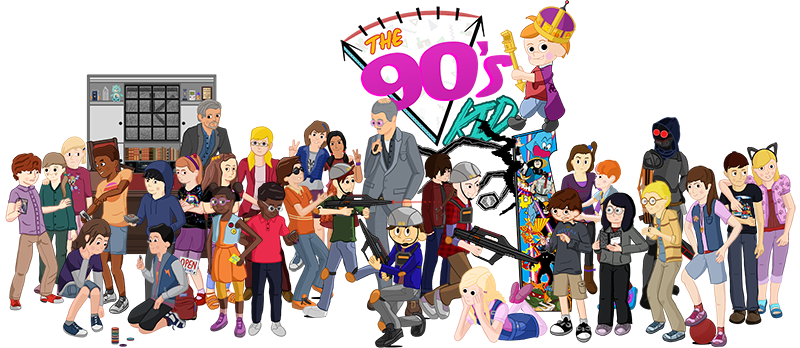AboutThe scripts were written, but no animation studio wanted to bite. The screenwriter was an unknown, who insisted that every licensed intellectual property mentioned and seen or heard in the story just had to be included, because they were vital to its universe. The costs would have been insane. So, the writer had to shelve his dream of making an animated show, at least for the time being, and instead translate his scripts to serialized novel form—while still making the show still feel like a cartoon. But that was okay, on paper both real and digital, the odds of getting sued for just using words and no visuals should be pretty low, right? And that means total freedom, to explore the 1990s in full. Movies, shows, music, historic events—everything gets a mention. Some of it advances the plot. All of it shapes the characters. After all, are we not raised in part by the media we grow up with? MTV, Nickelodeon, Nintendo, Sega, Windows or Macintosh, and yes, even the early internet. Still, this is a story that’s more than just about culture. It wants to say something about a certain generation of kids who grew up in a certain decade and are now poised to take over the world. Is it totally realistic? Not really. Is Royal Valley, the fictional city in which the story is set, one giant playground for a hundred kingdoms of kids just waiting to go out and have squirt gun fights and repeat the latest zingers from their favorite TV shows? Yeah, it’s closer to that. Let’s talk about it over a slice, okay? The 90’s Kid begins in 2020, when a 35 year old former, well, 90s kid discovers a time portal in his apartment’s pantry door. Fed up and bored with contemporary times, he goes in and emerges in July 1995. After spending some time in his beloved past and watching his younger self and his gang of friends live through 5th grade, our “hero” Wes returns to the present—but not for long. He’s got plans to improve his adult life by rectifying a few mistakes made in the past and setting a better course for himself that he hopes will end up giving him a better outlook. To do that, he enlists the help of his eleven year-old recent elementary school graduate, Jace, a kid obsessed with his smart phone, social media, and online video games. They arrive in summer, with Wes assuring Jace that it’s just a “quick weekend getaway,” showing off the mall and his old movie theater among other places. Little does the kid know that his uncle has far schemier plans in the works, that will take him all across the desert city of Royal Valley—and beyond. This is a story about the simple and the complex, from trying to fit in with a fifth-graders, playing with water guns in the neighborhood, and visiting an amusement park, to trying to avoid paradoxes and running from the mysterious, dangerous time-related entities that seem to be chasing the duo around. But, hey, if Wes could master the Toys ‘R’ Us Toy Run and conquer childhood when he was young, surely he and his mind full of pop culture trivia will help get the two out of any bad situation, like the possible collapse of spacetime. If it’s all to prevent a crummy adulthood, it’s worth the risk. |
|---|
- Home
- Art
- About
- Season 1
- S2
- S2.E1.Modern_Misery
- S2.E2.Detention_Contention
- S2.E3.Heating_Up
- S2.E4.Water_Wars
- S2.E5.Manic_Monday
- S2.E6.Park_Day
- S2.E7.The_Game
- S2.E8.Going_Dark
- S2.E9.Home_Insecurity
- S2.E10.Moving_Time
- S2.E11.Shadow_Kid
- S2.E12.April_Surprise
- S2.E13.Disaster_Report
- S2.E14.Down_Below
- s2.E15.Christmas_’89
- s2.E16.Decade_Dawn
- S3
- S3.E1.Time_Bomb
- S3.E2.New_Rerun
- S3.E3.Fifth_Grade
- S3.E4.Wind_Down
- S3.E5.Morning_Dew
- S3.E6.Summer_Shifts
- S3.E7.Broken_Clock
- S3.E8.Old_Newness
- S3.E9.Homecoming_Kids
- S3.E10.Before_Door
- S3.E11.Bad_Cop
- S3.E12.Restful_Reward
- S3.E13.Daemon-Tronics
- S3.E14.Grow_Up
- S3.E15.Last_Glimmers
- S3.E16.Nostalgic_Zenith
- S3.E17.Moribund_Animus
- S3.E18.Onward_Hereafter
- Movie
- Cast
- Royal Valley
- CD Mix
- Regents Walk >>>

- Night Mode
